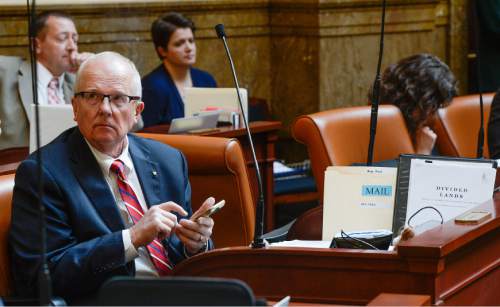This is an archived article that was published on sltrib.com in 2016, and information in the article may be outdated. It is provided only for personal research purposes and may not be reprinted.
Utah politicians are seriously deluded if they think the state is ever going to gain control of 31 million acres of federal land within the state's borders. No court will ever order it. No Congress will ever approve it. No president will ever stand for it.
But at least that delusion now includes some sense of responsibility to actually make a plan for how the state would handle such a windfall.
A bill from state Rep. Mike Noel, R-Kanab, might as well be titled the Utah Public Lands Fairies and Unicorns Act for all the chances it has of actually setting the rules for any territory. But the proposal, House Bill 276, at least takes seriously the colossal responsibility the state would take on if the windmills it is tilting at ever fall.
The bill, officially titled the Utah Public Land Management Act, is a long and detailed measure that purports to recognize the often conflicting ways that various groups of people with various priorities envision future use — on non-use — of all that land.
Both the authorship and the wording of the bill raise alarms that the preservation of public lands for such things as wilderness, watershed protection, historic and archeological values would be ignored in favor of destructive exploitation.
But, fully followed through, the bill and the public process it creates could do a lot to both draw out facts and arguments from rival interest groups and put on the record just what Utah's priorities would be if it ever actually controlled the lands in question.
As written, the bill goes out of its way to stress the priorities it sees for public lands: grazing, fish and wildlife, mineral extraction, rights-of-way, recreation and timber. That's a list that is likely to make sure that environmental and wilderness activists from across the country will organize to kill not only any plan to cede all those lands to Utah, but also to block the smaller, but similarly inclined, Public Lands Initiative pushed by U.S. Reps. Rob Bishop and Jason Chaffetz.
Noel in recent days has tried to allay the fears of those who see the state's land grab effort — and the $14 million being sought to pay the lawyers who claim Utah has a case — as no more than a vision of the state as an open pit mine surrounded by oil wells.
"It's not a drill rig on every piece of ground," Noel said. "I don't see that happening."
It's not happening. Because the federal lands in the state's cross hairs are going to remain federal lands.
In the meantime, Utah lawmakers can pass HB276 if it makes them feel better. The dog that keeps chasing cars should probably be praised for making a plan for what to do with the first one he actually catches.



